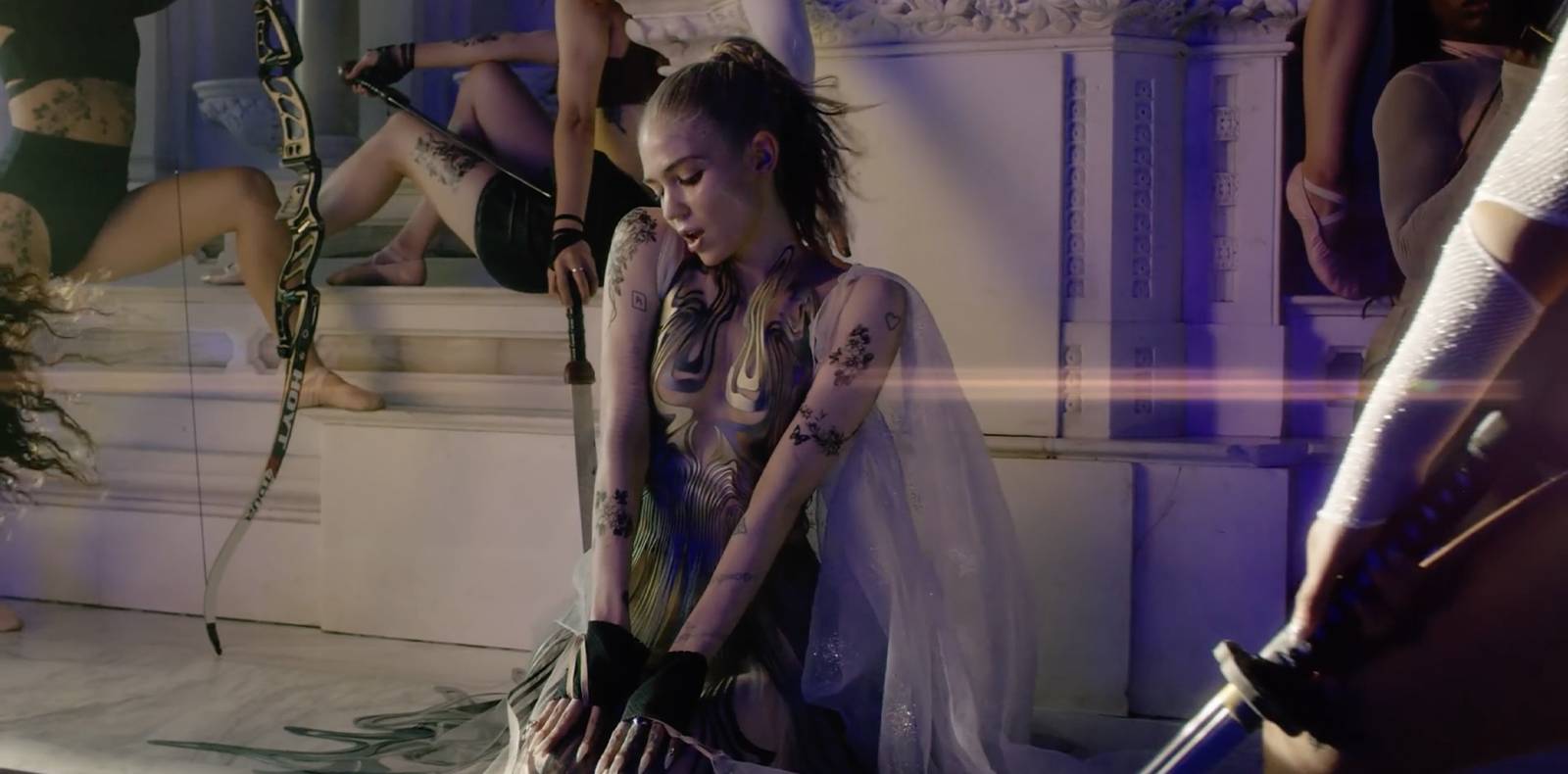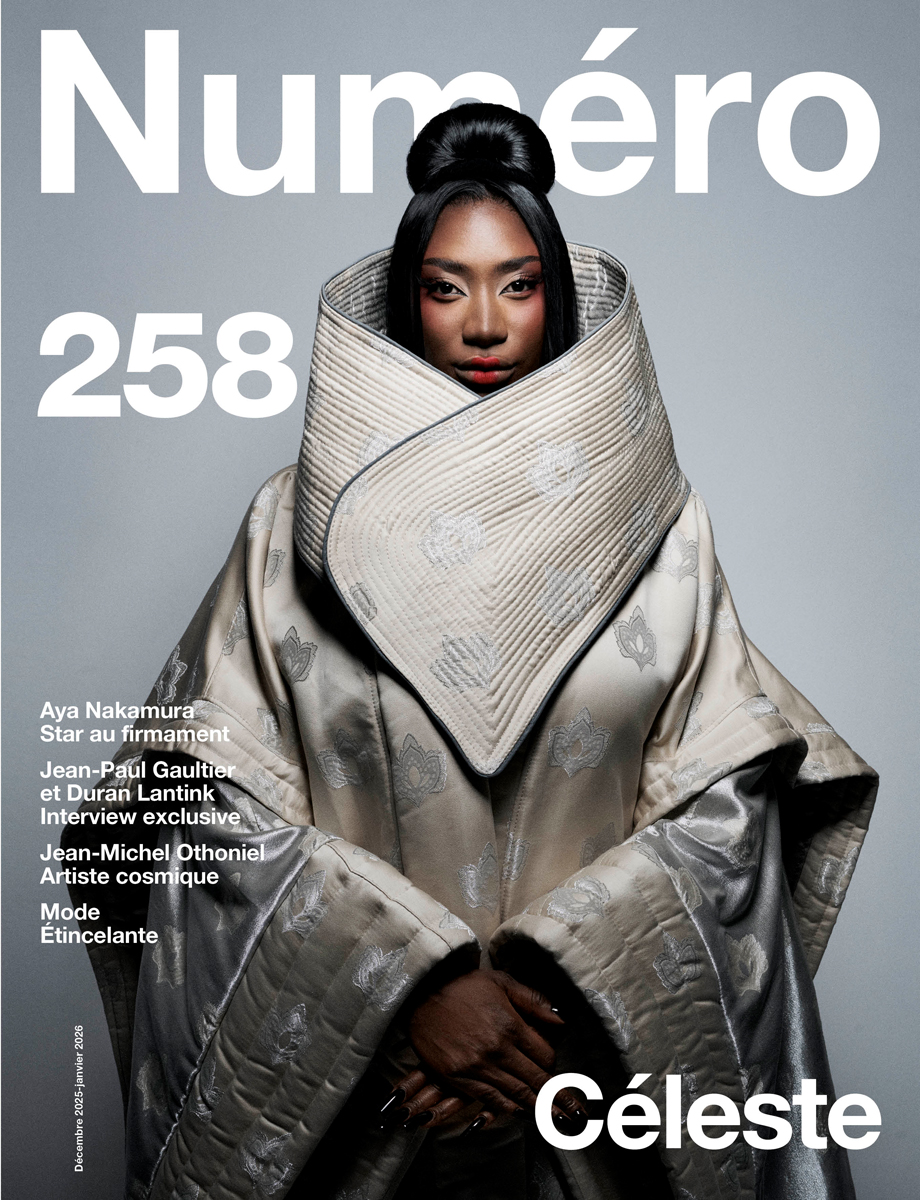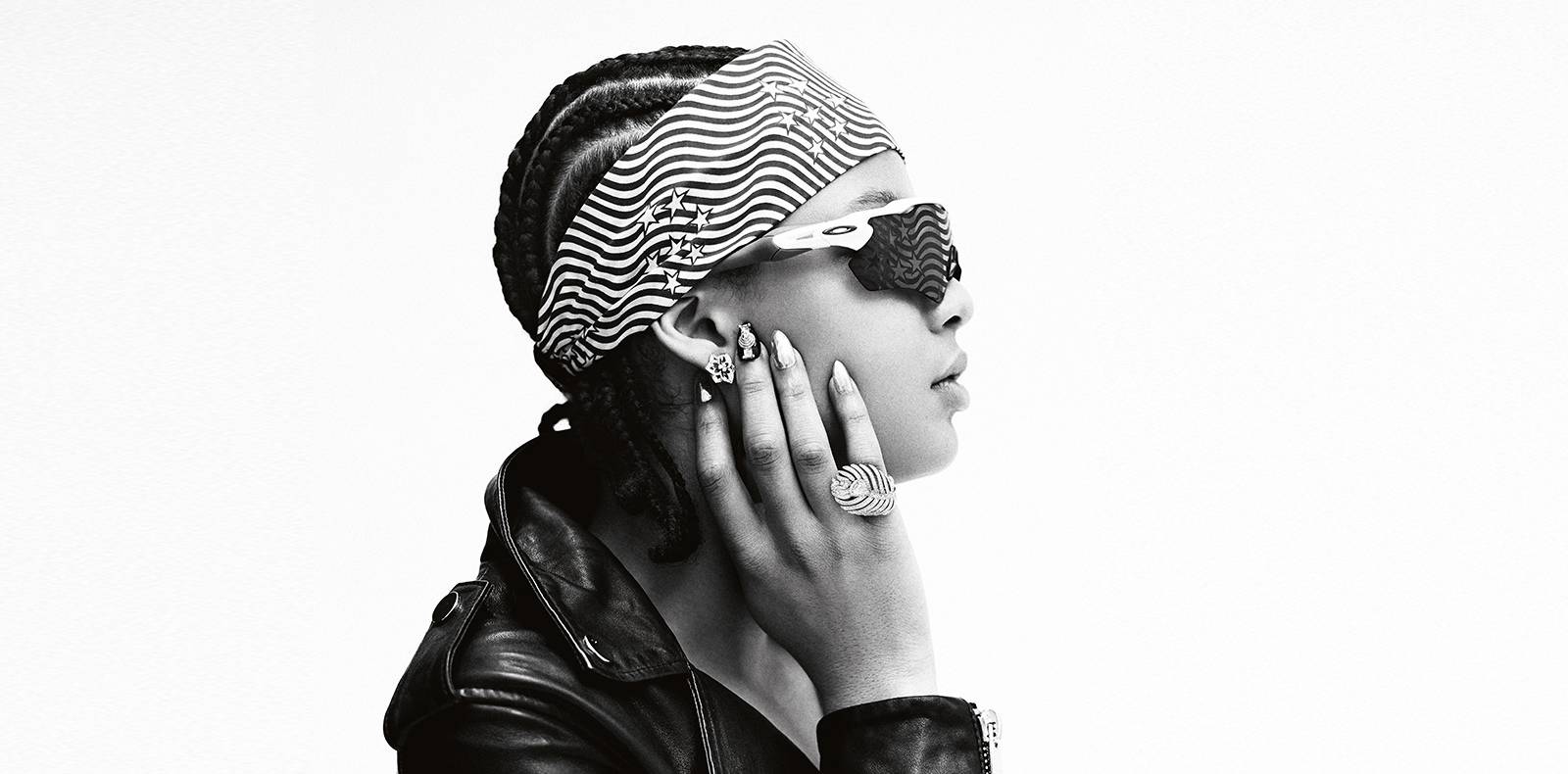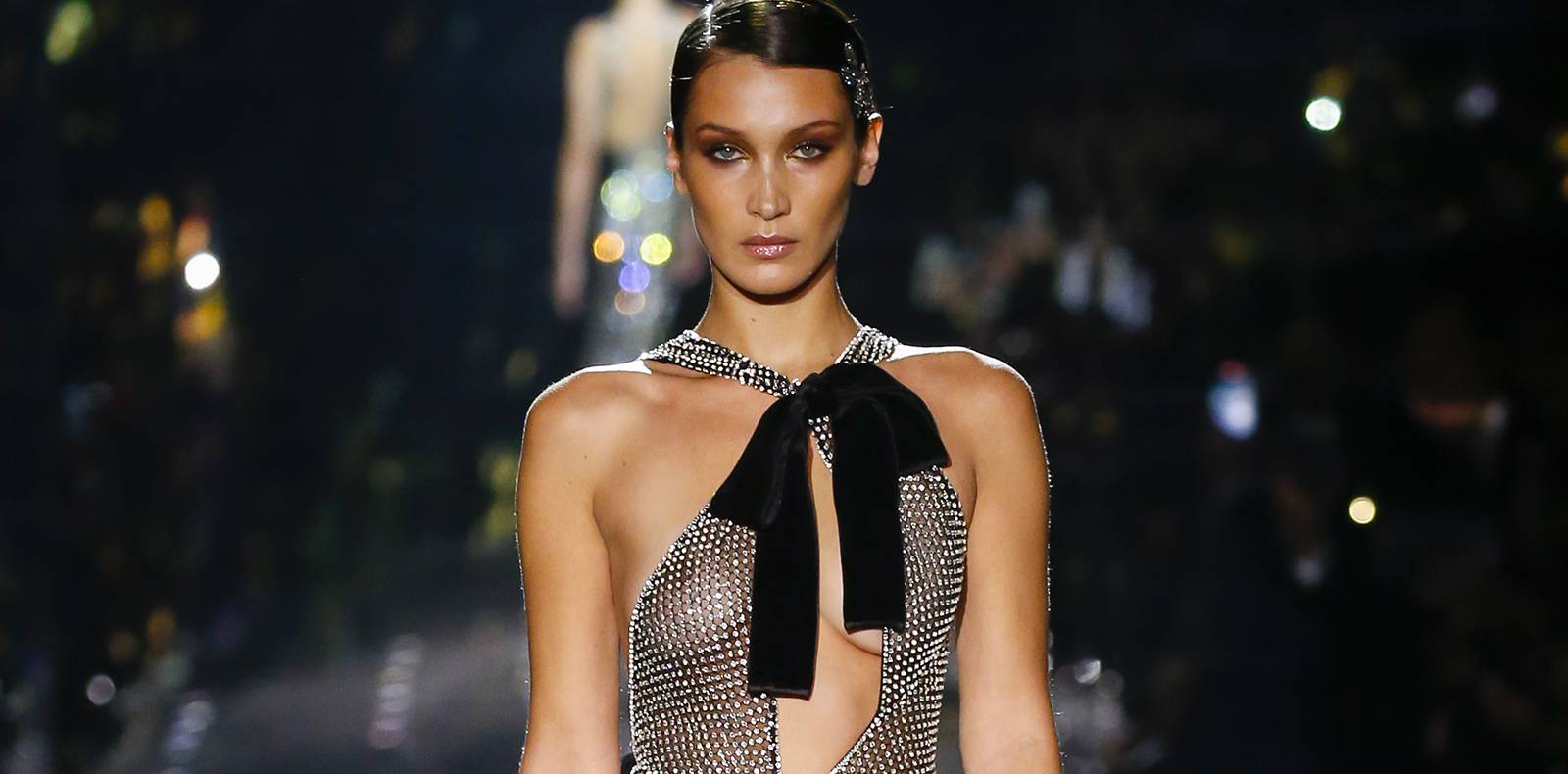
3

3
So, what’s the deal with Grimes’ new album?
Cinq ans après son dernier opus, “Art Angels”, Grimes revient avec “Miss Anthropocene”. Annoncé il y a quelques mois, ce nouvel album promettait une odyssée funeste sur le monde de demain, entre intelligence artificielle et réchauffement climatique. Qu’en est-il réellement ?
Par Lolita Mang,
By Lolita Mang.
L’intelligence artificielle s’apprête à remplacer les chanteurs. Et le réchauffement climatique détruit la planète un peu plus chaque jour… Dans un tel contexte, à quoi bon continuer à composer ? C’est la grande question que s'est posée Grimes en élaborant son nouvel – et dernier ? – album, en 2019. Miss Anthropocene est né ce 21 février, après des mois de teasings farfelus. Attendu comme le messie, cet opus se veut le déclencheur d’une nouvelle ère musicale. Disque conclusif adoubé par la presse avant même de voir le jour, il marque la fin du contrat qui reliait Claire Boucher – de son vrai nom – à la maison de disque 4AD. Que faut-il retenir de cette oeuvre “hybride”, mêlant mythologies ancestrales et réflexion sur le monde de demain ?
1. Teasings en série et attente démesurée
Miss Anthropocene associe misanthropie et l’anthropocène. Il faut donc marquer la liaison à l'oral. Grimes mêle l'aversion pour le genre humain à une notion controversée chez les scientifiques : l'anthropocène désigne l’ère au cours de laquelle l’humain a laissé une trace indélébile sur la Terre, notamment avec l’apparition du plastique et du développement de la chimie au XIXe siècle. Dans l’imagination de Grimes, Miss Anthropocene serait donc la déesse salvatrice du monde en proie au changement climatique. La Canadienne est “obsédée par le polythéisme antique”, comme elle le déclarait à Lana Del Rey en décembre 2019 : “J’adore comment les Grecs ou les Égyptiens ont vécu dans leur monde bizarre avec plein de dieux, qui représentaient tout et n’importe quoi”. N’importe quoi : c’est là où le bât blesse. L’idée de modeler un album entier autour des aventures apocalyptiques d’une déesse du plastique est pourtant loin d’être stupide. Encore faut-il assumer ses ambitions.
“Mon album est une démonologie moderne, dans lequel chaque chanson parle d’une façon différente de souffrir ou de mourir.”
Entre rêves de pop star et expérimentations futuristes, Grimes se serait-elle définitivement perdue ? Après avoir forgé un tel univers autour de son nouvel opus, difficile, finalement, de savoir à quoi s’attendre. Claire Boucher n’en est pas à son premier virage stylistique. Après avoir émergé sur la scène montréalaise en 2010 en tant que nouvelle icône du do-it-yourself avec Halfaxa, elle était rapidement devenue l’une des figures les plus intéressantes de sa génération, aux côtés de Björk ou FKA twigs. En 2015, Art Angels, plus pop et plus accessible, déçoit ses fans. La chanteuse elle-même a estimé que cet album devenu “une tache dans sa vie” était “de la merde”. De quoi définitivement brouiller les pistes pour la suite.
2. Le retour de la dreampop
Malgré ses promesses de renouveau, force est de constater que Miss Anthropocene est un album résolument pop. À la fois stellaires et soignées, certaines compositions, sublimées par des voix éthérées, demeurent saisissantes. So Heavy I Fell Through the Earth (Art Mix), qui ouvre le disque, fige le temps, une épopée onirique de six minutes. D’une extrême densité, le morceau se démarque par des chants haut perchés.
La première moitié du disque conserve la même force que son morceau introductif. Suivent les titres Darkseid, Violence ou encore 4AEM, que le public connaissait déjà. Tous font la part belle aux accents dreampop de Art Angels, que la chanteuse avait pourtant férocement rejeté. Certains invités de ce précédent opus reviennent sur Miss Anthropocene, comme Pan Wei-Ju, poètesse basée à Taipei, qui chante en cantonais sur Darkseid. Violence, produit par i_o, reste quant à lui l’un des morceaux les plus entraînants du disque. Avec des paroles répétitives, il décrit une relation abusive dont on ne saurait dire s’il s’agit d’un couple toxique, ou du rapport entre les humains et la Terre.
3. Pop éclectique
De My name is dark (Art Mix) à You’ll miss me forever when I’m not around, Grimes s’enfonce dans des compositions pop aux structures de plus en plus classiques, de moins en moins dynamiques. Delete Forever fait figure d'OVNI avec sa ballade rythmée par une simple guitare acoustique, un titre qui fait référence aux albums de pop-rock emo du début des années 2000.
L’âme qui donnait son énergie des singles déjà sortis disparaît donc à mesure que Miss Anthropocene, au profit d'une musique plus intimiste. “Mon album est une démonologie moderne – comprendre : l’étude des démons –, dans lequel chaque chanson parle d’une façon différente de souffrir ou de mourir.” Mais peut-être que l'album se suffit à lui-même et mérite une écoute sans explication de texte.
Artificial intelligence is on the verge of replacing human singers. And global warming is destroying the planet a little bit more every day… In such a joyless context, is there actually any point in composing anymore? This is the big question asked by Grimes on her new – and last? – album. Miss Anthropecene saw the light of day on February 21st, after months of endless wild teasers. Anticipated like the messiah, this new opus has the intention of triggering a new musical era. A conclusive record loved by the press – before they even heard it – it also marks the end of the contract between Claire Boucher – her real name – and the record label 4AD. So, what do we take from this “hybrid” work, mixing ancestral mythology and a reflection on the world of tomorrow?
1. Serial teasers and an excessive wait
Miss Anthropocene combines misanthropy and anthropecene. It’s therefore necessary to mark the oral connection. Grimes mixes an aversion for humankind with a notion that’s controversial among scientists: anthropecene denotes the era during which humans left an indelible mark on the planet earth, notably with the appearance of plastic and the development of chemistry in the 19th century. In Grimes’ imagination, Miss Anthropocene would be the goddess of salvation responding to a world in the throes of climate change. The Canadian is also “really obsessed with ancient polytheism”, as she told Lana Del Rey in December 2019: “I love how the ancient Greeks or the ancient Egyptians lived in this weird anime world where there were just tons of gods that could be anything”. Anything: and there’s the rub. The idea of modelling an entire album on the apocalyptic adventures of a plastic goddess is far from stupid. But she’s still got to assume her ambitions.
"My album’s about a modern demonology or a modern pantheon where every song is about a different way to suffer or a different way to die."
Between pop star dreams and futuristic experiments, could Grimes be lost for good? After having forged such a specific universe around her new album, it’s difficult, ultimately, to know what to expect. This isn’t Claire Boucher’s first stylistic foray. After emerging on the Montreal scene in 2010 as the new do-it-yourself icon with Halfaxa, she quickly became one of the most interesting figures of her generation, alongside Björk and FKA twigs. But then in 2015, Art Angels, a record that was more pop and more accessible, disappointed her fans. Even the singer herself felt this album, which had become “a stain on her life”, was “shit”. Which is certainly one way to put up a smokescreen for the future.
2. The return to dreampop
But in spite of her promises for renewal, it’s clear that Miss Anthropocene is a resolutely pop album. Both stellar and soigné, certain compositions, sublimated by ethereal voices, remain striking. So Heavy I Fell Through the Earth (Art Mix), which opens the record, stops time in a dreamlike epic lasting six minutes. Incredibly dense, the song stands out for its high-pitched chanting.
The first half of the record retains the same force as its opening track. Hot on the heels of Darkseid, Violence and 4AEM, which the public already knew. All give pride of place to the dreampop accents of Art Angels, which the singer had once so fiercely rejected. Guests from this previous opus are also back on Miss Anthropocene, including Pan Wei-Ju, a poet based in Taipei, who sings in Cantonese on Darkseid. Violence, produced by i_o, remains one of the most catchy songs on the record. With its repetitive words, it describes an abusive relationship that leaves us unsure if it’s about a toxic couple, or the relationship between humans and Earth.
3. Eclectic pop
From My name is dark (Art Mix) to You’ll miss me forever when I’m not around, Grimes plunges into pop compositions with increasingly classic structures, and a decreasing dynamism. Delete Forever is something of a UFO with its ballad punctuated by a simple acoustic guitar, making clear reference to the emo pop-rock albums of the early 2000s.
The soul that gave her energy to the singles already released therefore seems to disappears in favour of more intimate music on Miss Anthropocene. "My album’s about a modern demonology or a modern pantheon where every song is about a different way to suffer or a different way to die." But perhaps the album is sufficient in itself and deserves to be listened to without any explanatory text.














